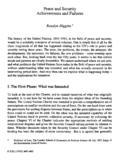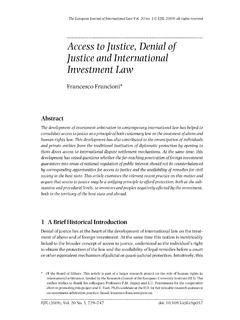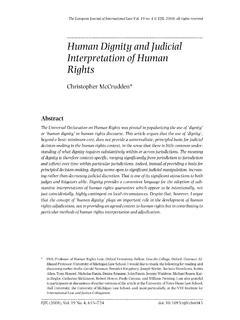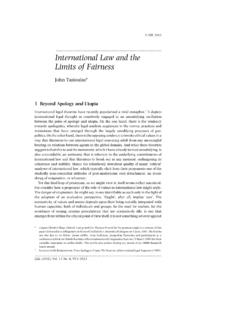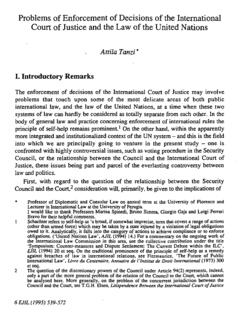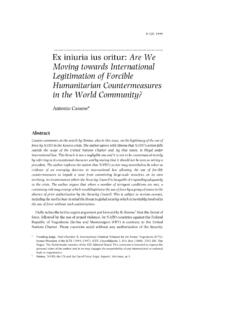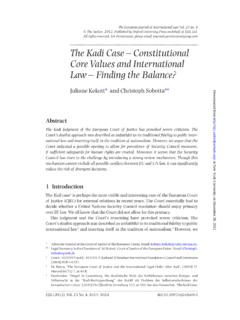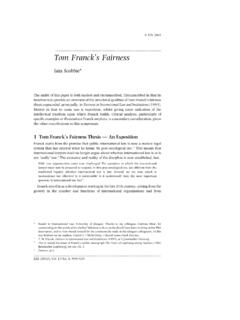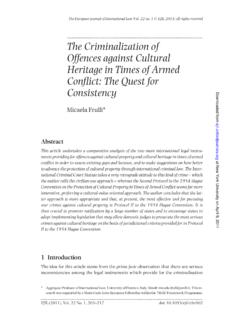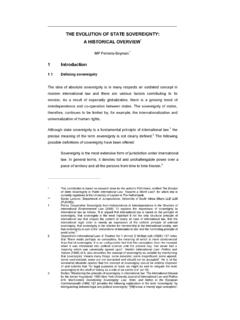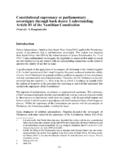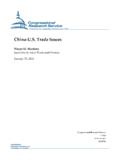Transcription of The Concept of Sovereignty Revisited
1 The European Journal of International Law Vol. 17 EJIL 2006; all rights (2006), Vol. 17 No. 2, 463 474doi: Concept of Sovereignty RevisitedJens Bartelson*Beaulac, St phane. The Power of Language in the Making of International Law. TheWord Sovereignty in Bodin and Vattel and the Myth of Westphalia. Leiden: MartinusNijhoff, 2004. Pp. 200. 90. ISBN , Thomas L. (ed.). Reconfigured Sovereignty . Multi-Layered Governance in the GlobalAge. Aldershot: Ashgate, 2003. Pp. xii + 224. $ ISBN , Neil (ed.). Sovereignty in Transition. Oxford: Hart, 2003. Pp. 556. essay, in discussing some recent contributions to the contemporary debate on Sovereignty ,focuses on what is at stake in this debate.
2 While most authors today agree that the meaning ofthe Concept of Sovereignty is open to change across time and space, students of internationallaw and international relations disagree about the causes and consequences of this conceptualchange. While some scholars take such changes to be indicative of a correspondingtransformation of global institutions, others regard them as evidence of the remarkableendurance of the Westphalian order. In this essay, I argue that this disagreement depends lesson divergent accounts of the world, and more on the ontological status implicitly accorded toconcepts by these authors.
3 I conclude by pointing out that the very emphasis on the changingmeaning of Sovereignty makes normative problems intrinsically hard to settle, and that dealingwith this impasse will be a major challenge to legal and political theory in the years to Concept of Sovereignty , once relatively uncontested, has recently become a major boneof contention within international law and international relations theory. Rather thanpresupposing that the Concept of Sovereignty has a timeless or universal meaning, morerecent scholarship has focused on the changing meanings of this Concept across a variety*Professor of International Relations, University of Copenhagen.
4 Email: 17 (2006), 463 474 of historical and political Much of this contestation and subsequent historicalexploration has been undertaken as a result of an earlier linguistic reorientation within thesocial and legal sciences. One main upshot of this reorientation has been to claim that lan-guage, rather than being a neutral medium of representation, is actively involved in theconstitution of legal and political reality. Yet, contrary to initial expectations, the linguisticturn has increased rather than diminished the staying power of the Concept of sovereigntywithin legal and political discourse. The very moment that scholars decided that the mean-ing of Sovereignty lies very much in what we make of it through our linguistic conventionsand rhetorical practices, they also opened up a new field of inquiry within which this con-cept could survive and thrive, albeit now as an object of inquiry rather than as its uncon-tested foundation.
5 What then became the subject of great interest was the question of whythe meaning of this Concept changes across time and space, and under what conditionsthese changes in turn spill over into institutional change on a grand outcome of this reorientation is that the previously distinct concerns of aca-demic international relations and international law have tended to converge. The veryfocus on the Concept of Sovereignty brought about by this linguistic reorientation ratherthan on the facts or norms of sovereign statehood has provided a common ground wherethe concerns of lawyers and political scientists can again meet, relatively undisturbed byepistemological differences.
6 Both disciplines have now deconstructed themselves back to anormal working relationship, with enough common ground to make their differencesseem topical rather than merely confusing. As a result, the Concept of Sovereignty hasbecome the focal point of an interdisciplinary debate that concerns the most basic of ques-tions: In what kind of world do we live, and what kind of entities make up this world?Two main answers to this question compete within contemporary internationalrelations theory. According to the first view, the sovereign state is unlikely to remainthe main locus of political authority and community in the future.
7 It is challenged bynew constellations of authority and community which transcend the divide betweenthe domestic and the international spheres, and will soon be replaced by new forms ofpolitical life that know nothing of this distinction. Yet the tricks that the Concept ofsovereignty continues to play on our political imagination make it difficult to makecoherent sense of these new constellations as they do not conform to the indivisibilityand discreteness that characterize Sovereignty . This Concept should therefore eitherbe abandoned, or be redefined in order to make sense of these new Spruyt, The Sovereign State and Its Competitors: An Analysis of Systems Change (1994); J.
8 Bartelson,A Genealogy of Sovereignty (1995).2C. Reus-Smit, The Moral Purpose of the State. Culture, Social Identity, and Institutional Rationality in InternationalRelations (1999); D. Philpott, Revolutions in Sovereignty : How Ideas Shaped Modern International Relations (2001).3 For different versions of this argument, see, , Gill, Reflections on Global Order and SociohistoricalTime , 16 Alternatives (1991) 275; Luke, Discourses of Disintegration, Texts of Transformation: Re-Reading Realism in the New World Order , 18 Alternatives (1993) 229; Cerny, Globalization and theChanging Logic of Collective Action , 49 International Organization (1995) 595; Clark, Beyond the GreatDivide: Globalization and the Theory of International Relations , 24 Review of International Studies(1998) at 479.
9 Agnew, Mapping Political Power beyond the State Boundaries: Territory, Identity, andMovement in World Politics , 28 Millenium (1999) Concept of Sovereignty Revisited465 According to the second view, the sovereign state is likely to remain a potent source ofauthority and community even in the future. Those emergent constellations ofauthority and community that allegedly challenge the predominance of the sover-eign state are ultimately only manifestations of its successful Sovereignty are thus indicative of the remarkable endurance of this Concept in both theoryand practice. When properly understood, therefore, the Concept of sovereigntyretains much of its explanatory power and normative closer inspection, much of this disagreement turns out to be a matter of philo-sophical principle rather than indicative of the political makeup of the world.
10 In thisauthor s view, the underlying sticking point in this debate concerns the ontologicalstatus of concepts, a question that has been conveniently neglected by many of thosewho have taken the linguistic turn within political science and law. Indeed, manyconstructivists seem to assume that this question has been settled once and for all,and are thus blind to the ontological implications of their own arguments. On the onehand, the belief that Sovereignty is undergoing profound change is greatly facilitatedby a nominalist view of concepts since, according to this view, concepts are nothingbut general names that we use to constitute different classes of objects as distinct fromeach other.
